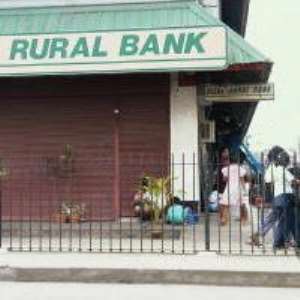
In recent times, the global banking system has witnessed tremendous upgrade in the regulatory framework and the Basel Accords has been the apotheosis of this reform. Although the implementation of the Third Basel Accord has been postponed severally, it has the prospect to alter the global banking system once more as this regulatory framework primarily focuses on capital adequacy, stress testing, and market liquidity risk. In developing economies today, the banking sector is the integral chunk of the economy; playing the key role of a financial intermediary by bridging the gap between savings and investment. The banking sector in these economies has been plagued with bank failures; the leading cause in most cases has been credit risk.
A World Bank report in 2016 shows that Ghana had a rural population of 45.32% out of a total population of 28.21 million. This shows that close to half of the total population live in rural areas in Ghana. In 1976, rural banks were established in Ghana, with a prime goal to provide banking services to the rural population. The objective for setting up these rural banks was to provide credit to farmers, small-scale businesses and other developmental projects. Rural banks in developing countries, specifically Ghana cannot be extricated from the risk exposures associated with managing credit. Given their importance to the economy, appropriate measures should be taken to mitigate credit risk exposures of rural banks in the country. In a recent study published on credit risk management in rural banks in Ghana by the International Journal of Economics and Finance; which has Professor Olajide S. Oladipo of York College, the City University of New York as the editor-in-chief. It was discovered that even though most rural banks had implemented a rigorous credit risk management policy; which included loan appraisal, rural banks rely heavily on collateral security in mitigating credit risk.
The study was carried out to critically examine the credit management practices, credit policies and strategies for managing credit as well as challenges faced in this practice and to recommend solutions that will mitigate the credit risk exposures of rural banks in Ghana.
A purposive sampling technique was adopted to select a sample size of forty respondents which comprised of branch managers and credit officers from four different branches of a rural bank. A well-structured questionnaire and a face-to-face interview were used to collect primary data for this study. Both primary and secondary data were used in this research work. The study recommends that rural banks should work in partnership with credit reference bureaus in the country. This will increase the capacity of rural banks to effectively access adequate information on loan applicants and identify creditworthy loan applicants. Rural banks should also consider creating a loan recovery department that will be solely responsible for recovering overdue loans. It is important for rural banks to ensure that credit officers monitor customers regularly to ensure that credit accessed by borrowers are used for the intended purpose within a specified time frame.
Alexander Ayertey Odonkor is a chartered financial analyst, a chartered economist and an author of eight insightful books. Alexander`s recent research paper on human capital and economic growth in developing economies has been ranked among the top ten papers by SSRN in 2019. Alexander holds a first degree in economics and finance, a master’s degree in finance and a staggering postgraduate education at Harvard University, Massachusetts Institute of Technology, New York Institute of Finance, University of Adelaide, Delft University of Technology, Curtin University, Babson College and Corporate Finance Institute. Even with a budding career, Alexander has made it into the prestigious forty-five notable alumni of Kwame Nkrumah University of Science and Technology.
He is also a fellow of the Global Academy of Finance and Management in the United States and a member of the American Economic Association.
http://www.ccsenet.org/journal/index.php/ijef/article/view/0/37273




 Whoever participated in the plunder of the state must be held accountable – Jane...
Whoever participated in the plunder of the state must be held accountable – Jane...
 A vote for John and Jane is a vote to pull Ghana from the precipice of destructi...
A vote for John and Jane is a vote to pull Ghana from the precipice of destructi...
 I’ll repay your abiding confidence with loyalty, understanding and a devotion to...
I’ll repay your abiding confidence with loyalty, understanding and a devotion to...
 ‘I’ve learnt deeply useful lessons for the future' — Serwaa Amihere breaks silen...
‘I’ve learnt deeply useful lessons for the future' — Serwaa Amihere breaks silen...
 I’m sorry for the embarrassment – Serwaa Amihere apologises for leaked sex video
I’m sorry for the embarrassment – Serwaa Amihere apologises for leaked sex video
 Dumsor: Matthew Opoku Prempeh not in charge of Energy sector – Minority
Dumsor: Matthew Opoku Prempeh not in charge of Energy sector – Minority
 Adu Boahen’s murder: Police arrest house help who was in possession of deceased’...
Adu Boahen’s murder: Police arrest house help who was in possession of deceased’...
 Akufo-Addo nominates Felicia Attipoe as Tema West MCE
Akufo-Addo nominates Felicia Attipoe as Tema West MCE
 Election 2024: I can't have someone I defeated twice as my successor – Akufo-Add...
Election 2024: I can't have someone I defeated twice as my successor – Akufo-Add...
